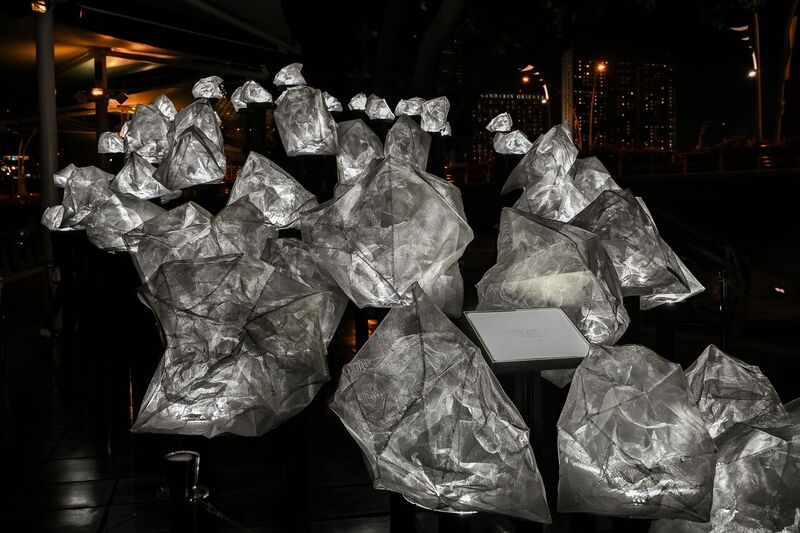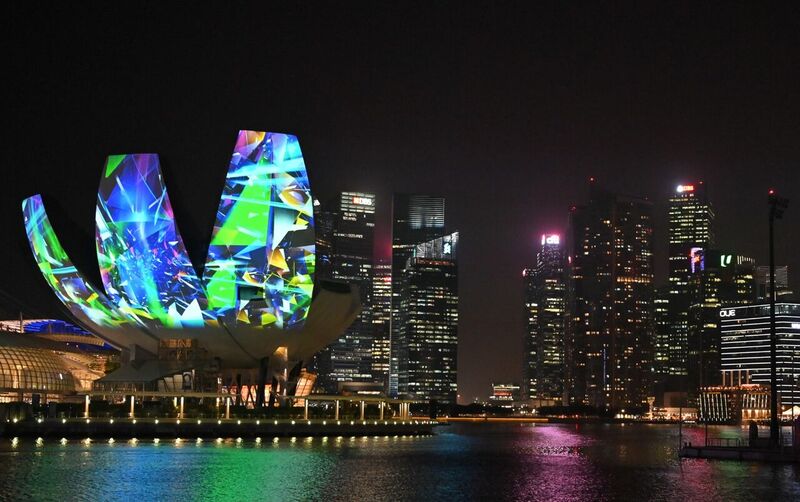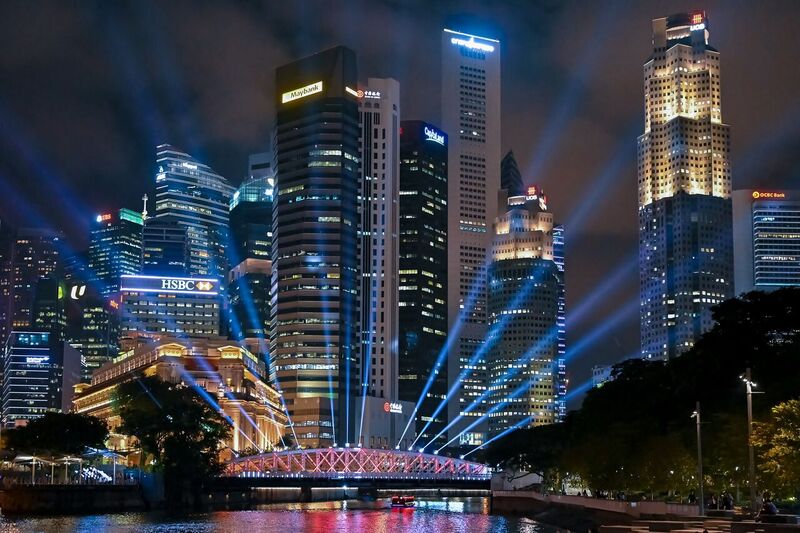After the iconic disappearing act pulled off by Sir Stamford Raffles along the Singapore River at the start of the year, the long-awaited Singapore Bicentennial kickstarts its commemorative activities in luminous exuberance with i Light Singapore – Bicentennial Edition. Starting from Jan 28 through Feb 24, strolls along Marina Bay will take on a more reflective tone, where locals and tourists alike can ponder upon the last seven centuries in Singapore’s historical narrative; watch it all unfurl in multi-coloured visual spectacles scattered across an expanded perimeter.
Already a mainstay since 2010, the sustainable light art festival is curated to the theme ‘Bridges of Time’, featuring 32 installations and a multimedia show expanded beyond Marina Bay to include the Civic District, Singapore River and Raffles Terrace at Fort Canning Park. History is no longer painted in mere hues of black and white, and instead comes alive in these illuminated artworks—this time inclusive of spaces where the earliest communities had first set foot on, drawing both the old and new together into a collective liminal space. With a bigger focus on bringing people together, the curated collection features both local and international artists, and engages more than just visuals; you can jiggle a joystick around, see your own face get blown up on-screen, and choose sounds by pressing buttons.
Clinching the first prize of the i Light Student Award, this group of architecture students from National University of Singapore (NUS) presents Cenotaph for a Stone, a ghostly reinterpretation of the mythical Singapore Stone. Comprising 51 rock fragments each on their own individual steel pedestals, it mimics a frozen snapshot of the Stone’s would-have-been explosion, suspended in the air; walking around its perimeter allows further inspection of each individual fragment. In spite of its fragmented orchestration, they come together to form an impression of the Stone in its whole; save for the deliberately-missing 52nd piece, in tribute to the singular authentic Stone remnant in the National Museum today. Handcrafted out of soft mesh-like materials, the contrast of the ruggedness of the Stone against the softness of its reinterpretation continues to retain the unsolvable mysticism of the Stone.

Cenotaph for a Stone
If you’re just hanging around The Lawn @ Marina Bay, watch out for VOUW’s City-Gazing Singapore instead of the stars. Condensing the past one hundred years of Singapore’s expansion into a thirteen minute visual presentation, what you’ll be getting is an aerial view of Singapore akin to that out of an aeroplane window, having blossomed from a few arterial roads to the international hub it is today. Having dug into archives of dusty and ancient maps, designers Justus Bruns and Mingus Vogel employ the overview effect, zooming visitors out into the bigger picture of Singapore’s progression and expansion over recent history; projecting a larger awareness of the fragility of oneself against the vastness of the rest of the world. Both awe-inspiring and humbling, it leaves room to wonder about what lies ahead in the stars of Singapore’s future.
UJI Studios’ Facey Thing at the waterfront promenade is wittily satirical, and will surely become a crowd favourite. Playing on mainstream selfie culture while critiquing universal surveillance, it’s an interactive screen built with a camera, capturing faces of passers-by and blowing them up on-screen. Watch as an accidental unglam shot gets enlarged right in front of the eyes, spy-television-show style; there is no need to be afraid of using the face as an artistic tool here, for the interactive screen allows you to virtually paint with your faces. With that much visibility, the artpiece cheekily dismisses any notion of being a mere face in the crowd.
The pristine white facade of the ArtScience Museum makes for a fitting screen for the colourful projections of Danny Rose’s Lighthouse of Time. Playing with the perception of space, it’s a sight to behold against the dark sky; prismatic coloured lights dancing across the surface abstractedly in a tango of lights and shadows, as if themselves possessing mass and weight. Luminous exuberance of this scale takes all its onlookers through the whole emotional spectrum, and provides an intangible constant in time; a projection of the beauty and romance of Singapore’s future.

Lighthouse of Time
Adopting the common clothes peg as a building block of the future, Prospegtive Perspective models an outline of the scenic Singapore skyline through layers of transparent pegs. A multi-generational symbol of the typical Singaporean household, set against the glory of the glass skyscrapers, the peg gets a futuristic revamp—a bold statement of the possibilities of the future; an extension of the existing skyline and buildings not yet built. Designed to be walked through, it is a glimmering, imaginative bridge to the hereafter.
The Promontory @ Marina Bay lights up with 200 metres of digital neon tubing, wound all around custom-built steel framework. A sea of twists and turns, Squiggle resembles hasty scribbles employed in children’s drawings to depict crowds, and is Angus Muir’s representation of the multicultural society Singapore prides itself for. Waves of interchangeable colour pulses through the neon tubes, a vibrant representation of people across the different races and backgrounds. The colours, speed and direction can even vary with the movements of a joystick, culminating in an ever-changing field of dancing light and colour; a reflection of the dynamic world that we are all a part of. Yet, an interesting option of white washing over the squiggles sparks a question—are we all one and the same in collective identity, or merely indistinguishable from another?
Departing from mere visuals, music becomes an integral messenger for Xavi Bove and Onionlab’s Time Rhythm on Anderson Bridge. Projecting light right onto the night sky, it’s a gigantic light metronome that showcases time’s passing through the various stages of Singapore’s development. Accompanied by a narrated backstory, the bridge comes alive as a musical instrument, slow tempo and steady rhythm slowly accelerating into a flurry of sound and lights criss-crossing; a full nine minutes will have taken you through a full time warp straight to the present day. Immersive and majestic, Time Rhythm inspires thoughts of how the metronome of the future would look in time to come.

Time Rhythm
Immersive masterpieces that extend beyond mere visuals, i Light 2019 takes visitors on a full experience and journey through the past and to the present. Alongside a line-up of more than 20 programmes spanning across distinct hubs, it’ll spark conversations about sustainability and our city’s evolution, and sparks in us hopes for what lies ahead. As we continue our forays into the future and progress, may our history remain safely tucked into the recesses of our collective consciousness.
i Light Singapore – Bicentennial Edition runs from Jan 28-Feb 24. More info here.





